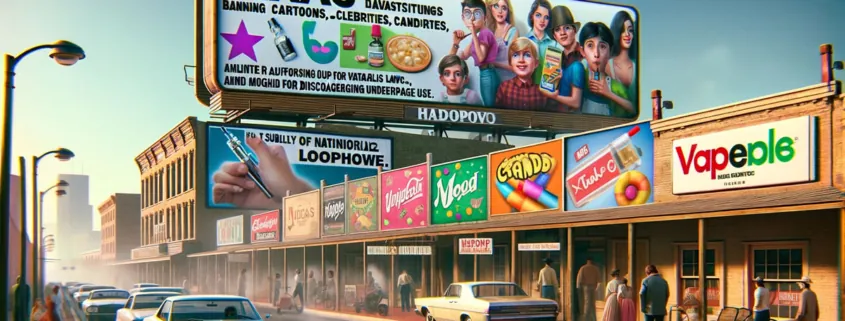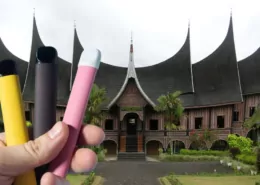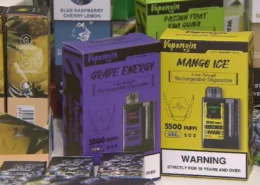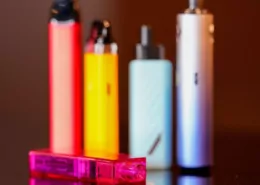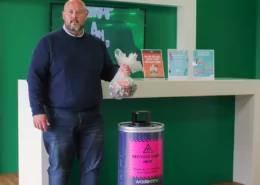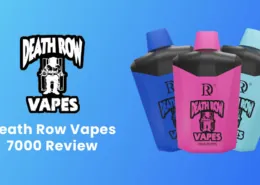Texas Law Restricts Vape Ads Using Cartoons, Celebrities
A new Texas law taking effect January 1st bans vape manufacturers and shops from using cartoons, celebrities, or kid-friendly imagery when marketing electronic cigarettes.
Known as House Bill 4758 or the Protecting Children from Electronic Cigarette Advertising Act, the legislation specifically outlaws e-cig promotions displaying:
- Cartoons or fictional characters appealing primarily to minors
- Trademarks or brands associated with underage consumers
- Symbols commonly used to market products to kids
- Celebrity endorsements
- Foods like candy or fruit resembling e-juice flavors
“It aims to curb marketing tactics clearly targeting young people and making vaping seem harmless or cool,” said Raji Srinivasan, a marketing professor at UT Austin.
Will Vape Companies Scale Back Youth-Oriented Marketing?
While federal pressure has already prompted voluntary industry pullbacks on teen-friendly advertising, Srinivasan expects Texas’ law to drive further cutbacks:
“Major marketers aren’t likely to abandon large Texas markets altogether. But I anticipate more careful approaches in terms of regulatory compliance,” she explained.
However, the size and profitability of vape businesses will also push some brands towards defiance through loopholes or outright violations.
“Effective enforcement with real penalties for violations in the law’s first months will determine how well it discourages youth-targeted marketing,” Srinivasan said.
Ongoing national scrutiny of the vape industry around youth sales may limit tolerance for violations in Texas. But as one of the largest U.S. markets, the state faces real challenges in motivating compliance.
Early Signs of Progress Seen in Reducing Teen Vaping
According to recent federal data, efforts across industries and states to curb underage e-cig use have shown early signs of working.
The CDC’s annual surveys found the percentage of high schoolers vaping dropped from 14% in 2022 down to 10% reporting use within the past month. Among middle school students, rates fell from 3.3% to 2.8% over the same period.
Savvy digital marketing and flavors like cotton candy or grape aimed at kids have driven rapid growth in teen vaping over recent years. But outrage over youth addiction and related health concerns sparked a cultural reversal where vaping shifted from trendy to taboo.
Texas’ advertising limits represent the latest measure to accelerate declining youth participation by continuing to chip away at perceptions of vapes as safe or cool.
Ongoing regulatory and social pressures promise to further counteract the industry’s former free rein to hook underage users. Tighter age verification, retail display restrictions, and funding for prevention education also bolster protection for youth.
Vape Critics Remain Wary More Action Needed
However, anti-tobacco advocates argue regulations still fail to match the vape industry’s relentless drive towards profits over ethics.
Groups like the Campaign for Tobacco-Free Kids vow to continue pushing for flavor bans and other laws aimed at stopping teen use. They dismiss hopes of the industry responsibly self-regulating as naive given ongoing violations of age limits on sales.
But others question if deterring adult access to safer nicotine alternatives is an acceptable tradeoff for preventing all underage use. Though risks remain for non-smoking youth, vapes pose far less overall public health harms relative to traditional cigarettes.
Finding the right balance between safety and access remains key for policymakers aiming to maximize harm reduction for current smokers while shielding youth.
- Vaping Laws in South Dakota: Age, Tax & Public Use Guide in 2025 - July 13, 2025
- Is Vaping and Driving Illegal in South Carolina? (2025 Guide) - July 12, 2025
- Vaping Laws in South Carolina’s : A Comprehensive Guide 2025 - July 12, 2025

